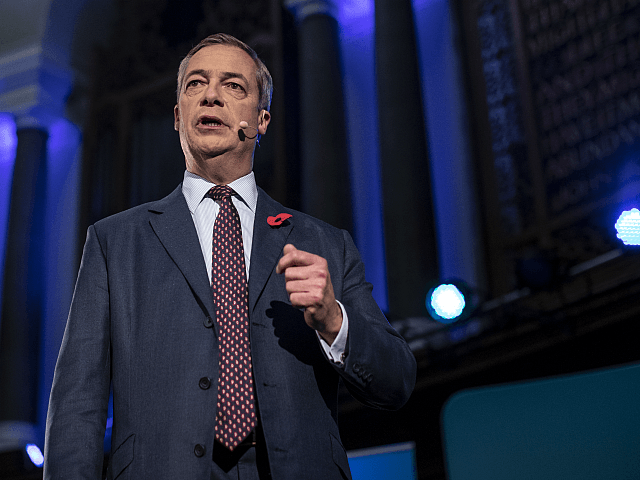Brexit Party leader Nigel Farage has warned that NATO and a future EU army cannot coexist.
Mr Farage said during a campaign event in Buckley, Wales, on Monday that Prime Minister Boris Johnson has to choose the UK’s place inside or out the European Defence Union. He said that if the nation commits to the proto-EU army post-Brexit, then the North Atlantic Treaty Organization could collapse.
“NATO and a European Defence Union cannot coexist equally,” Mr Farage said in comments reported by POLITICO.
He continued: “No man effectively can serve both. We’ve got a decision to make.”
Highlighting the importance of British military might to Europe, the Brexit Party leader said: “If we leave the European Defence Union, it becomes valueless. Because without [the UK], it doesn’t have the muscle that it needs.”
“But if we stay, don’t be surprised if NATO falls to pieces and we leave the security and protection that America had for us, thank God, twice in the last century,” he added.
Macron Looking for ‘Any Excuse’ to Get Rid of U.S., Build ‘Walter Mitty EU Army’, Says Farage https://t.co/yMf8jk3uAQ
— Breitbart London (@BreitbartLondon) November 9, 2019
Mr Farage’s comments come as President of the United States of America Donald J Trump is in the United Kingdom for a three-day visit to mark the 70th anniversary of NATO. During his trip, President Trump is meeting with NATO Secretary-General Jens Stoltenberg, German Chancellor Angela Merkel, and French President Emmanuel Macron.
The President had criticised the commitment of NATO members when in 2015, just five of the then-28-member union had hit the two per cent GDP minimum spending on defence (those countries being the U.S., UK, Greece, Poland, and Estonia). The USA funds around 70 per cent of NATO, spending 3.4 per cent of its GDP on defence.
In the subsequent years and with the support of Secretary-General Stoltenberg, more European countries have heeded the criticisms of President Trump and have recommitted to the spending target. Even Germany, which was set to fail to meet its own reduced spending target, recently committed to increased spending. Expanded to 29 countries, seven nations are now hitting their two per cent target.
However, French President Emmanuel Macron, who along with Germany is a great proponent of an EU army, claimed last month that NATO was suffering a “brain death”. He alleged America was “turning its back on us [Europe]” and questioned the U.S.’s “commitment” to the defence union and its members.
Macron’s comments proved unpopular with his European allies, with Germany’s Chancellor Merkel saying with an uncharacteristic bluntness that the Frenchman had used “drastic words” and “NATO remains a cornerstone of our security.” The former German defence minister and the next president of the European Commission Ursula von der Leyen also defended NATO as the “protective shield of freedom”.
President Trump started his NATO visit Tuesday by addressing Macron’s remarks, calling them “very insulting” and remarking that France had many problems of its own, stating: “Nobody needs NATO more than France.”
Farage: Von der Leyen Wants to Build ‘Updated Form of Communism’, Advance EU Army https://t.co/WvcFetxY43
— Breitbart London (@BreitbartLondon) July 16, 2019
While the Germans and the French leadership may disagree fundamentally on the importance of NATO, they, along with Brussels, remain the cornerstone of support for an EU army, which Mr Farage fears will over-extend its reach and threaten the 70-year-old transatlantic alliance.
Mr Macron had said in November 2018 that the EU needs its own army to “protect ourselves with respect to China, Russia, and even the United States of America”. The call for a “real, true European army” was backed by Chancellor Merkel, the European Commission, and senior European Parliament politician Guy Verhofstadt.
Mr Farage warned in July that as president of the EU’s powerful executive arm, Mrs von der Leyen would advance plans for a European army, saying: “She’s a fanatic for building a European army, but she’s not alone. When it’s completed, NATO will cease to exist or have any relevance in Europe at all.”
In 2017, EU member states signed up to the Permanent Structured Cooperation process, or PESCO — a key element of the bloc’s Defence Union plans formulated by the outgoing European Commission president, Jean-Claude Juncker, who had said the EU needs an army by 2025.
Mr Farage told voters in Wales on Monday that is EU is “not just talking about building their European Defence Union; they are talking about flexing their muscles around the world”.
“I find that in itself very alarming talk. What is clear, what is absolutely clear, is they want NATO out of Europe. That’s what the politicians in Brussels want,” he continued.
“I would say that in a world where there are some major serious threats, we need that military relationship with America today as much as we have ever needed it,” Mr Farage added.
Future German Leader Calls for EU Army to Avoid Being ‘Plaything’ of U.S., China, Russia https://t.co/ubUHuGUo6x
— Breitbart London (@BreitbartLondon) February 8, 2019

COMMENTS
Please let us know if you're having issues with commenting.